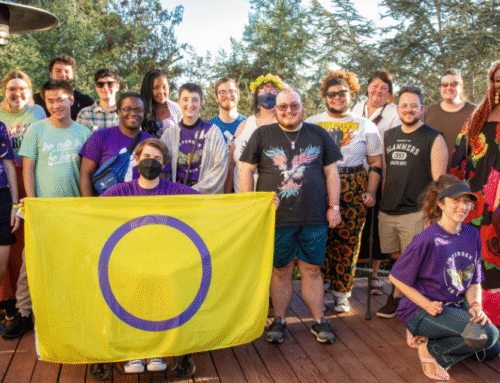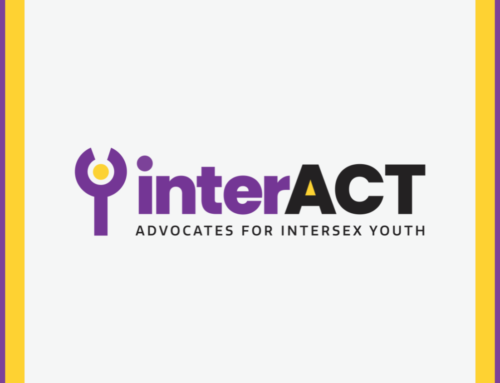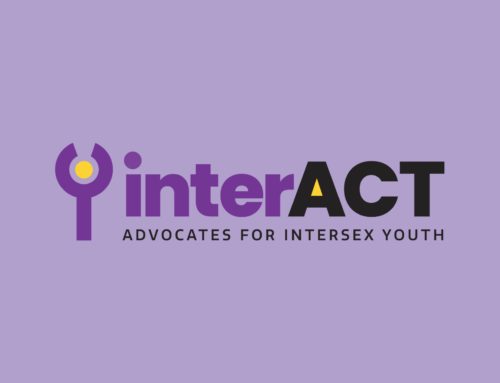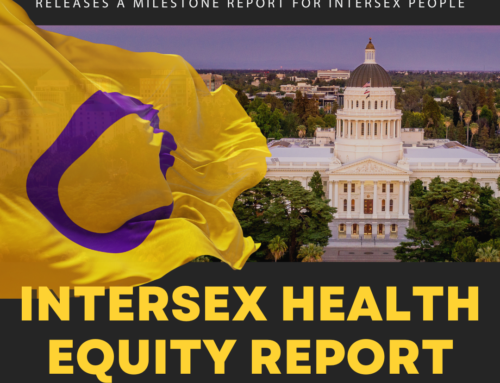Created With the Community in Mind
We are 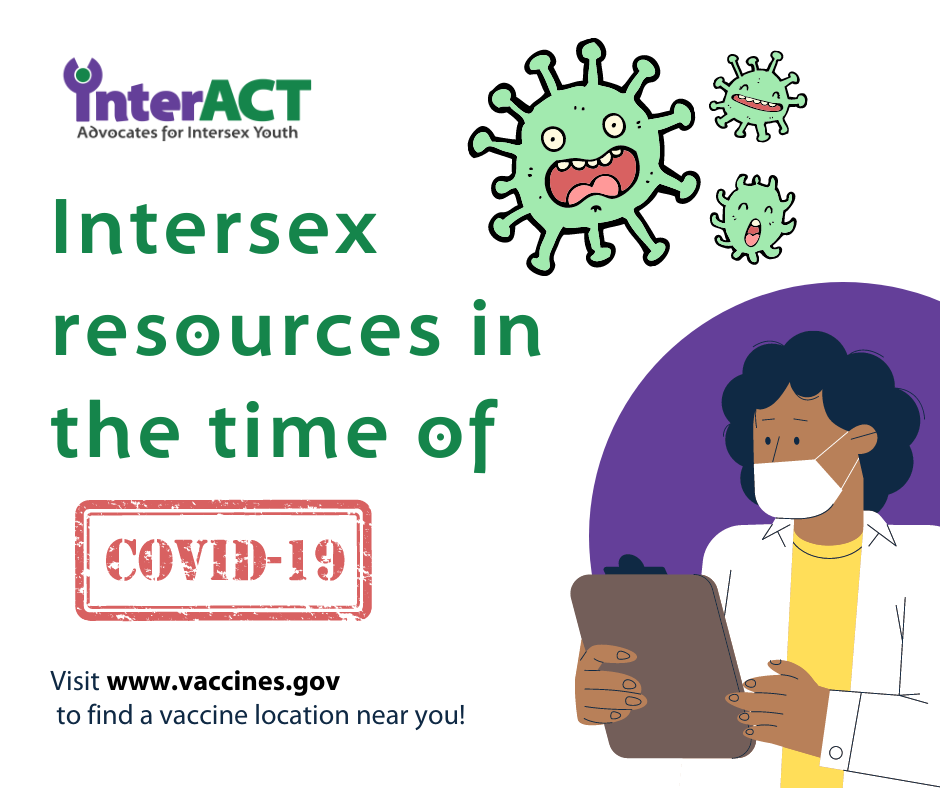 all experiencing the effects of COVID-19 in one way or another. It is important to remind ourselves that there is no one right way to cope with our current reality. It’s okay to grieve.
all experiencing the effects of COVID-19 in one way or another. It is important to remind ourselves that there is no one right way to cope with our current reality. It’s okay to grieve.
For some, physical distancing might mean having more time to connect with loved ones at home and virtually, to binge-watch the newest Netflix series, or finally finish that rainy day project. For others, distancing might mean struggling with social isolation, navigating challenging family dynamics and limited resources, or feeling the financial pressures of the shutdown. Throughout these challenging and uncertain times, seeing intersex people come together gives us hope.
With intersex communities in mind, the interACT team created this COVID-19 starter pack with tips and resources to help get us all through.
Tips on Seeking Medical Care During COVID-19
Intersex people face unique barriers in healthcare. Since many intersex people have a history of medical trauma, seeking care for any reason can be stressful. What should you do if you are intersex and need medical care for COVID-19?
Remember that it’s okay to say “no” to unnecessary tests and medical examinations. Testing for COVID-19 shouldn’t require questions about genitalia or sex traits, for example. You can set boundaries with healthcare providers. Know what to expect by previewing CDC guidelines for COVID-19 testing.
If you’re getting tested in person, have someone from your household accompany you for moral support. Due to social distancing guidelines, they may have to wait in the car during your appointment. Calling or video chatting with friends before or after a medical appointment can also help.
If you are an intersex person who needs prescription hormones, see if your doctor and/or insurance can give you more than a 30 day supply. Some prescriptions can be refilled in 90-day increments. This will reduce trips out of the house. Some larger chains and cities may also offer mail delivery services.
Find a COVID-19 Vaccine Near You
The CDC now recommends that moderately to severely immunocompromised people receive an additional dose of mRNA COVID-19 vaccine after an initial 2-dose series. Learn more here.
Community and Mutual Aid Resources
The Houston Intersex Society created a COVID-19 mutual aid fund for intersex people. While the fund closed on March 22nd, this is a powerful example of intersex people coming together to support each other. Keep an eye on their page and other local and regional groups that may run mutual aid programs.
- Mutual Aid Starter Pack Tips and More
- Coronavirus Resource Kit
- Nonprofit Resource List
- Resources for Undocumented Immigrants and Their Families
COVID-19 Reading List: Books with Intersex Main Characters
If you have more time at home, why not learn more about intersex issues? Most books can be ordered online.
- XOXY, a memoir detailing the life journey of intersex activist Kimberly Zieselman, interACT’s Executive Director
- Raising Rosie, a memoir and guidebook about one family’s experience raising and parenting their intersex child (by interACT Board member Eric Lohman and his partner, nurse Stephani Lohman).
- None of the Above, a fictional story about a teenage protagonist who discovers she is intersex (by interACT Board member I.W. Gregorio).
Free Intersex Documentaries and Videos to Watch Online
- Intersexion, a documentary about the lives of intersex people coping with societal pressures, relationships, and discrimination (free with Amazon Prime).
- She’s Not a Boy, a documentary about intersex activist Tatenda Ngwaru’s search for belonging.
- Human Rights Watch’s video on intersex surgery, detailing the harms that intersex children face, and advocates’ fight to end irreversible infant genital surgeries.
- CNN’s video on genital surgeries on intersex infants, with interACT Board members Dr. Ilene Gregorio and Eric Lohman, Stephani Lohman, and interACT’s Executive Director Kimberly Zieselman.
- Ponyboi, a short film starring award-winning intersex activist and filmmaker River Gallo whose character is an intersex runaway whose journey to find love and belonging discovers something so much more, self-wroth.
Intersex YouTube Channels
- Hans Lindahl, interACT’s former Director of Communications and Outreach, offers educational videos on all things intersex.
- Emily Quinn, an interACT Youth member and former staff member shares educational videos about being intersex and talks about their own experience.
- Pidgeon, a former interACT staff member, and filmmaker talks about their personal experience and what it’s like being intersex in today’s world.
- Alice Harrison, an intersex artist, engineer, musician, and interACT Youth member uses their platform to come out as intersex and provide some education on a variation known as chimerism.
Resources for Teaching About Intersex While Homeschooling or Remote Learning
Intersex Resources for Elementary School
- What Does Intersex/Variation of Sex Characteristics Mean? video by Pop’n’Olly, narrated by intersex activist and interACT Youth member Anick Soni and recommended for students in elementary through middle school
- Intersex Across the Animal Kingdom video, by host Hank Green, talks about how intersex is much more common than we think, and not just in the human species!
Intersex Resources for Middle or High School
- Intersex is Awesome TED Talk by interACT Board member Kristina Turner and their child and intersex activist Ori Turner (this talk might be best for middle school or high school students, but is suitable for all ages)
- What’s It Like to Be Intersex? Intersex advocates come together to tell you about the many ways to be intersex and some of the challenges faced by the intersex community.
- How to Make your GSA Intersex Friendly includes video resources and a video viewing guide. This is a good resource for adults to use with all school-age students (once school is back in session!)
Intersex Resources for College Students
- Contesting Intersex: The Dubious Diagnosis by intersex scholar, author, TedTalk speaker, and former board president of interACT, Dr. Georgiann Davis. In this book, Georgiann discusses the harms of framing intersex as an abnormality.
Resources Related to Mental Health, Stress, and Coping
- CDC Recommendations
- 5 Mental Health Apps to Help Manage Coronavirus Anxiety
- Crazy Talk: Is My Anxiety Around COVID-19 Normal — or Something Else?
- National Alliance on Mental Illness
- 3 Types of Stress Affecting Everyone in 2021
LGBTQ+ Specific Resources
Not all intersex people are LGBTQ+, but some are. Intersex people often face similar issues to LGBTQ+ people, such as needing to access hormones or struggling with feeling accepted by friends and family. With that in mind, these resources can be helpful.
- Webinar Recording on How COVID-19 Affects the LGBTQ+ Community
- LGBTQ+ Resource List
- Queer Under Coronavirus
- Quarantining in a Non-LGBTQ+ Accepting Environment
- The Coronavirus (COVID-19): What Transgender People Need to Know
- Guidelines for chest binding during COVID-19
Collected by Bria Brown-King, interACT, Director of Engagement, updated on August 23, 2021.


